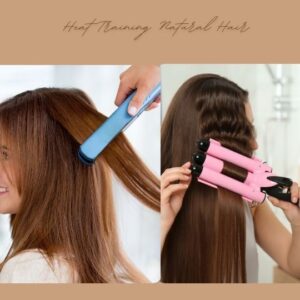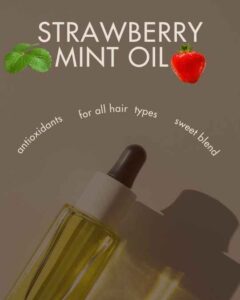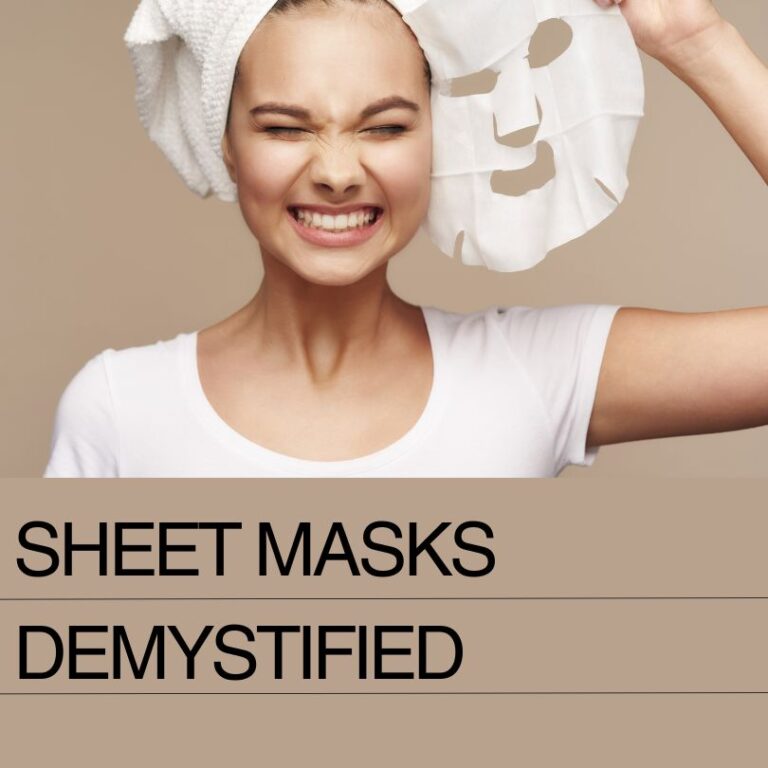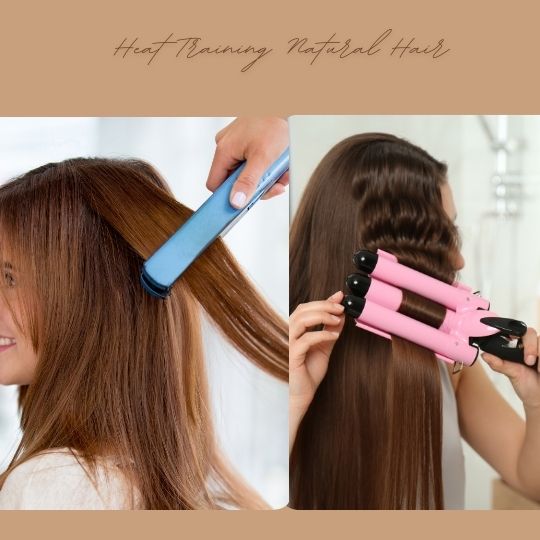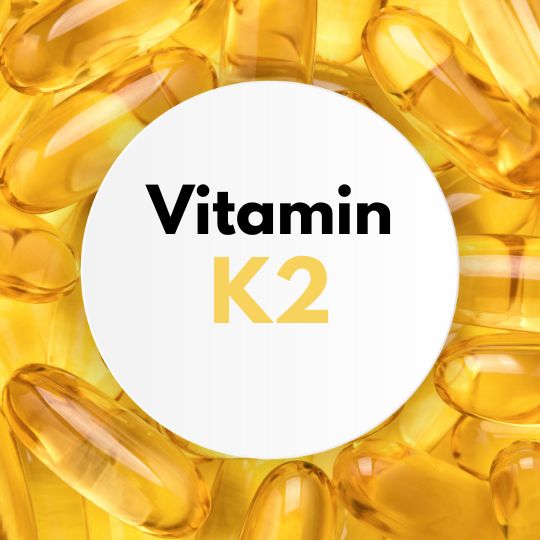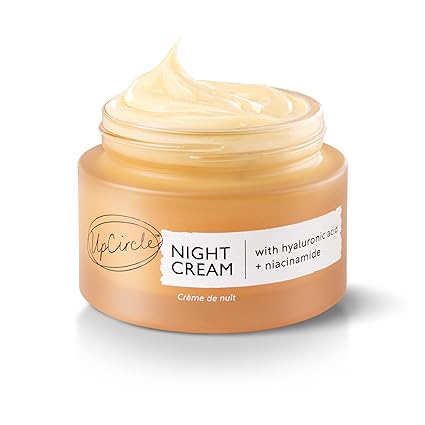Kitsch Rice Water Shampoo Bar, is an all-natural, organic, cruelty-free, sustainable estrogen-packed Rice Water Shampoo Bar for Hair Growth. Kitsch Rice Water Shampoo Bart is quickly achieving traction as the best option for people avoiding chemical-laden products.
Still, if you are switching to more eco-friendly hair products, it’s worth taking a closer look at the brand’s formulations, packing, and ingredients. In this post, we’ll explore the pros and cons of Kitsch shampoo bars, highlight important details about silicone and sulfate content, and offer tips for choosing the best option for your hair type.
Table of Contents
ToggleWhat is Kitsch Rice Water Shampoo Bar?
Kitsch’s Rice Water Shampoo Bar is part of the brand’s eco-conscious movement, using the power of rice water to promote hair growth, strengthen strands, and improve shine. Rice water is rich in amino acids, vitamins, and minerals that repair damaged hair, making it a popular ingredient in many haircare routines.
But the big plus is the fact that the Shampoo is in a solid state – at least there will be less use of plastic bottles and it is an environmentally friendly product. Such products bear the Leaping Bunny logo which ensures consumers that none of the animals was harmed during the production of the kitsch products in question. Also, it is small and therefore convenient to carry around, especially for travelers.
Are Kitsch Shampoo Bars Silicone-Free?
According to the information that can be found on Kitsch’s website, their products do not contain silicones, but there’s more to it. The first Kitsch Castor Oil Nourishing Bar was formulated to have dimethicone, which is a type of silicone, in it and this simply leaves your hair greasy and weighed down after some time. Although the company has changed its formulation for shampoo bars to remove dimethicone, there exist other products in circulation by different stores.
To avoid this, always double-check the ingredients list before purchasing. Look out for Dimethicone on older versions of the Castor Oil Nourishing Bar (ingredients like Sodium Cocoyl Isethionate and dimethicone), as these are signs you’re dealing with the older, silicone-laden product.
Are Kitsch Shampoo Bars Sulfate-Free?
Yes, Kitsch shampoo bars are sulfate-free. This is a positive change, as sulfates can be harsh on hair and strip away natural oils. However, the absence of sulfates also means that shampoo bars containing silicones may not cleanse your hair thoroughly enough, leaving behind residue that could weigh down your strands. This is why it’s important to avoid older formulas with silicones, as they won’t rinse out as easily without a strong surfactant.
Kitsch Conditioner Bars: A Word of Caution
Kitsch’s conditioner bars have also undergone a reformulation. Previously, they contained multiple silicones (including Dimethicone and Cyclomethicone). While the company has removed these ingredients from its current conditioner bars, an old stock with the older formula can still be found. Avoid conditioners in spotty packaging if you’re looking to stay silicone-free.
Key Ingredients and Benefits
- Rice Water: Known for its ability to promote hair growth and strengthen hair strands, rice water is rich in vitamins like B and E, as well as amino acids. It helps restore the hair’s natural shine and reduce breakage.
- Castor Oil: Often found in hair growth products, castor oil nourishes the scalp and promotes thicker hair. It’s also great for hydration.
- Rosemary: Another popular ingredient for hair growth, rosemary stimulates the scalp, encouraging blood circulation and healthier, fuller hair.
- Sulfate-Free Formula: The Kitsch Rice Water Shampoo Bar is sulfate-free, meaning it’s gentle on the scalp, great for curly and colored hair, and won’t strip your hair of natural oils.
Kitsch Rice Water Shampoo Bar full Ingredients:
- Sodium Cocoyl Isethionate – A mild, coconut-derived surfactant that creates a creamy lather while being gentle on the scalp.
- Sodium Methyl Cocoyl Taurate – Another coconut-based surfactant, helping to cleanse without stripping the hair of natural oils.
- Vegetable Glycerin – A natural humectant that helps lock in moisture, making your hair feel softer and hydrated.
- Hydrogenated Castor Oil – Known for its moisturizing properties, castor oil helps nourish the scalp and promote hair growth.
- Guar Hydroxypropyltrimonium Chloride – A conditioning agent derived from guar gum that reduces static and improves hair manageability.
- Rice Protein – Strengthens the hair shaft and adds volume, contributing to the “rice water” effect of improving hair elasticity.
- Shea Butter – A nourishing butter that hydrates and softens hair while also promoting scalp health.
- Coconut Oil – Adds moisture and shine to hair while helping to reduce frizz and strengthen strands.
- Sunflower Seed Oil – Rich in vitamins and antioxidants, it moisturizes hair and protects against environmental damage.
- Fragrance (White Tea & Mandarin) – Provides a light, pleasant scent. While Kitsch uses fragrance in their formula, they clarify that it includes essential oils like lavender, sandalwood, and rose for a natural aroma.
- Essential Oils (Lavender, Sandalwood, Rose) – These essential oils are used for fragrance and therapeutic benefits such as calming and soothing the scalp.
Key Points:
- Silicone-Free: The latest formula no longer contains dimethicone or other silicones, making it ideal for those looking to avoid product buildup.
- Sulfate-Free: Kitsch Rice Water Shampoo Bar is Free from harsh sulfates that strip natural oils, making it gentler for daily use.
- Paraben-Free: No parabens are used in Kitsch Rice Water Shampoo Bar ensuring a safer formula for both the hair and scalp.
- Phthalate-Free: Kitsch Rice Water Shampoo Bar is free from phthalates, which are chemicals often linked to health concerns.
Price:
The Kitsch Rice Water Protein Shampoo Bar is priced at around $14 on various retail sites like Ulta Beauty and Amazon. Keep in mind that prices may vary depending on the retailer, promotions, or shipping costs if ordered internationally.
How to Use the Kitsch Rice Water Shampoo Bar
- Wet your hair thoroughly.
- Rub the bar between your hands to create a lather or apply directly to your scalp.
- Massage the lather into your scalp and hair, focusing on the roots.
- Rinse thoroughly and follow with a conditioner (consider a matching Kitsch Rice Water Conditioner Bar for best results).
Pros of Kitsch Shampoo Bar
Light and Pleasant Scent: Kitsch Rice Water Shampoo Bar has a gentle fragrance that leaves your hair smelling fresh.
Clean, Soft Hair: Users report that the Kitsch Rice Water Shampoo Bar effectively cleanses the hair, leaving it soft and clean without the heavy residue that some products can leave behind.

photo Amazon
Cons of Kitsch Rice Water Shampoo Bar
While Kitsch shampoo bar has many fans, there are a few areas to consider before making the switch:
Dry Hair Without Conditioner: Some users noticed their hair felt dry when they didn’t use a conditioner after washing. This is especially true for people with dry or textured hair. So it’s best to pair the Kitsch Rice Water Shampoo Bar with a conditioner for optimal moisture retention.
Occasional Plastic Packaging: Although Kitsch markets itself as a zero-waste brand, some customers reported receiving bars packaged in plastic bags. That was not a promise of eco-friendliness.
Low Lather: Similar to most shampoo bars, Kitsch Rice Water Shampoo Bar does not create as much foam as liquid shampoo. If you have not tried the shampoo bar before then this might take some time for you to use it comfortably.
Best Conditioner for Thin Asian Hair
Pairing the shampoo bar with the right conditioner is key. Thin Asian hair has looked for lightweight conditioners that won’t weigh your hair down, such as a silicone-free formula. Kitsch’s Rice Water Conditioner Bar is an excellent choice. It maintains volume while nourishing the hair.
Other Related Products
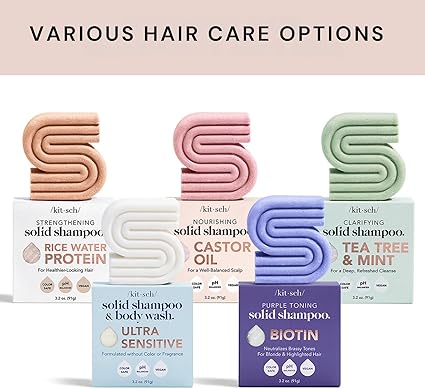
photo Amazon
- Rosemary Shampoo Bar for Hair Growth
- Shampoo and Conditioner Bars
- Coconut Oil and Castor Oil Shampoo Bars
Common Concerns
- Shampoo bar ruined my hair: Some users report difficulty adjusting to solid shampoo bars. This usually happens during the transition from liquid shampoos with sulfates to natural bars. Be patient, and your hair will adapt.
- Does rice water go bad: Yes, homemade rice water can go bad. Store-bought products like Kitsch’s Rice Water Shampoo Bar have a longer shelf life thanks to added preservatives.
- Is Kitsch a clean brand?: Kitsch prides itself on using natural, non-toxic ingredients and is both cruelty-free and eco-friendly.
Competitor Comparison: Kitsch vs. Viori
Two brands leading the charge in this niche are Kitsch and Viori, both offering solid shampoo bars infused with the power of rice water. While these brands share similar goals, they differ in ingredients, sustainability practices, and consumer experiences. Let’s take a deep dive into how Kitsch and Viori compare and which brand might suit your needs better.
Here’s a comparison table between Kitsch Rice Water Shampoo Bar and Viori:
| Feature | Kitsch | Viori |
|---|---|---|
| Brand Philosophy & Mission | Cruelty-free, eco-conscious, minimal waste | Focuses on sustainability, ethical sourcing, supports Red Yao tribe |
| Key Ingredients | Rice water, castor oil, rosemary, sulfate-free | Longsheng rice, bamboo, aloe, shea butter, sulfate-free |
| Scent Options | Limited scent options | Multiple scents (Citrus Yao, Hidden Waterfall, Terraced Floral) |
| Hair Type Compatibility | Suitable for all hair types, especially thin, curly, color-treated hair | Formulas for various hair types (dry, oily, normal, damaged) |
| Sustainability & Packaging | Zero-waste packaging, plastic-free | Compostable packaging, biodegradable, supports Red Yao tribe |
| Product Range | Smaller range, includes conditioner bars and scalp tools | Wider variety of shampoos, conditioner bars, and scents |
| Targeted Hair Concerns | Hair growth, thickness, fragile hair | Volume, hydration, oily hair, damaged hair |
| Price | More affordable | Slightly higher, offers subscription service for discounts |
| Ethical Sourcing | No direct cultural connections | Direct support for Red Yao tribe, ethical ingredient sourcing |
| Cruelty-Free Certification | Leaping Bunny certified | Cruelty-free, biodegradable products |
| Best For | Budget-conscious, eco-friendly hair growth | Unique formulations, support for indigenous culture, and luxurious scents |
This table provides a clear side-by-side comparison to help decide between Kitsch and Viori based on key factors.
Conclusion: Is Kitsch Right for You?
Kitsch Rice Water Shampoo Bar is another shampoo bar that won’t hurt the planet or animals; it’s also great for the hair as long as you pick the right variant. Do not use products that contain old stocks that still have silicones in them if you are aiming to prevent build-up and decrease your consumption of plastic.
Pro Tip: Pair it with Kitsch’s conditioner bar or a rosemary shampoo bar for optimal hair health.
FAQs:
- Where can I buy Kitsch Shampoo Bar? Kitsch Rice Water Shampoo Bars are available on their website, Amazon, and select retailers.
- Is Kitsch shampoo good for thin hair? Yes, it’s great for adding volume without weighing down fine hair.
- Does rice water shampoo have protein? Yes, rice water is a natural source of protein, helping to strengthen and repair damaged hair.
- Does Kitsch Rice Water Shampoo Bar Work? Many users, especially those with thin Asian hair or curly, colored hair, have praised its volumizing effects and gentle cleansing. It’s particularly loved for not stripping the hair of moisture.



